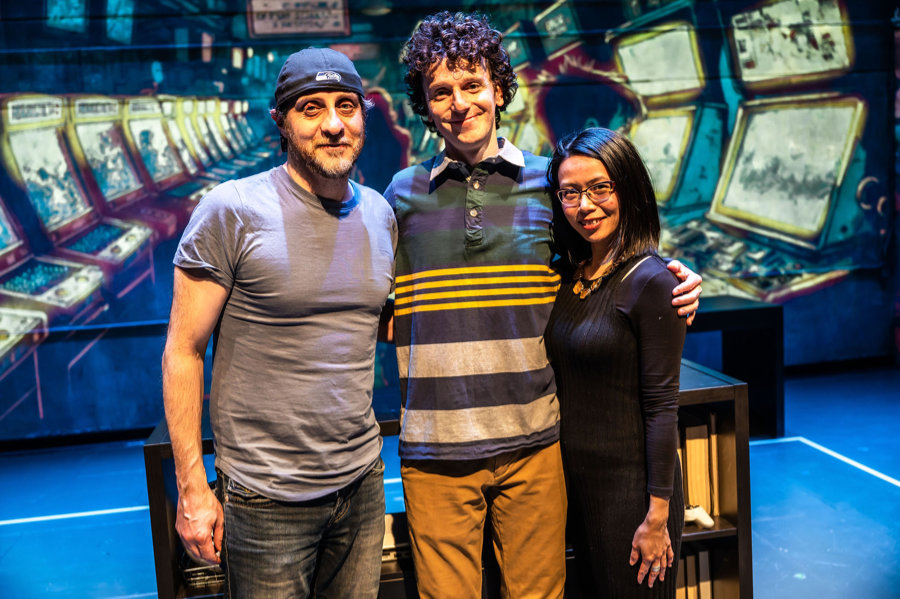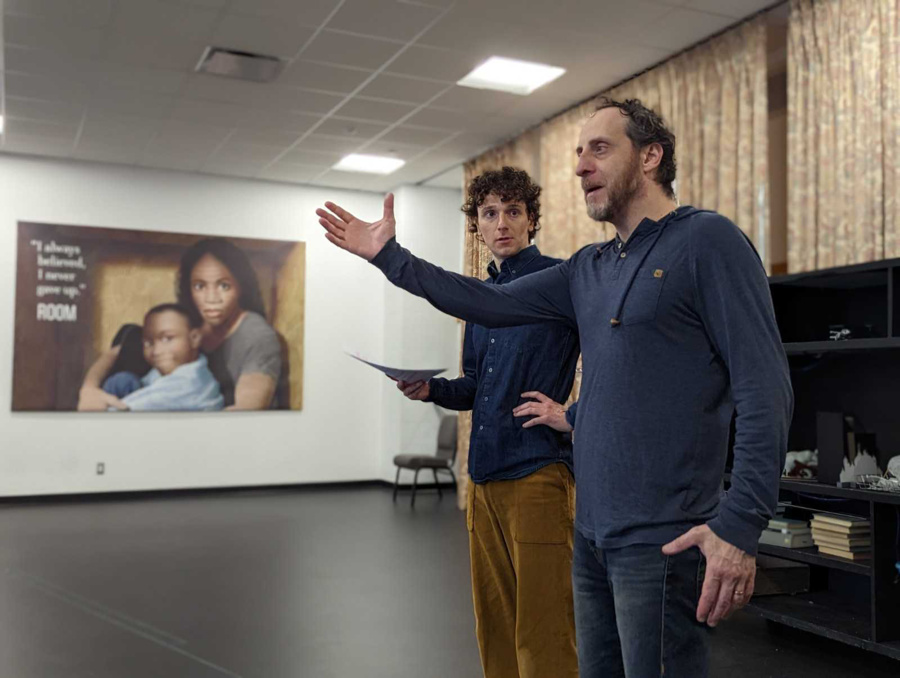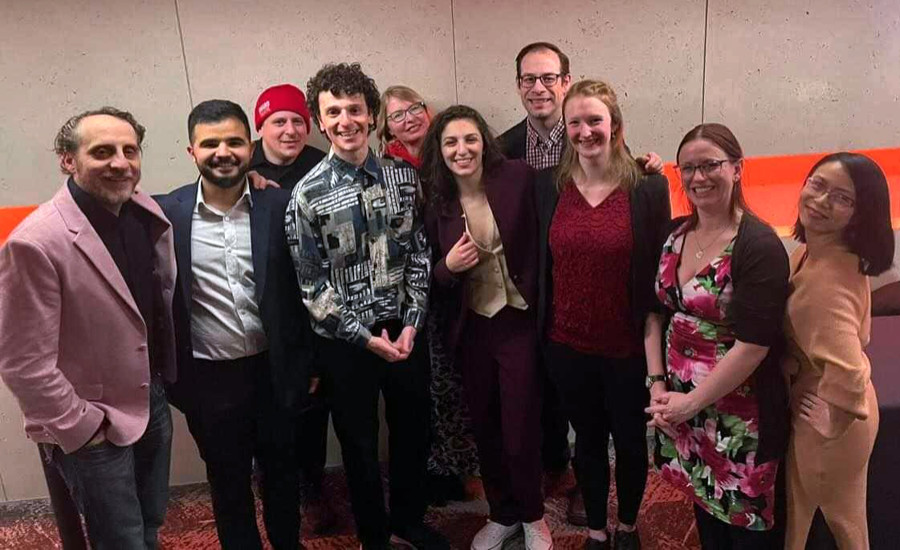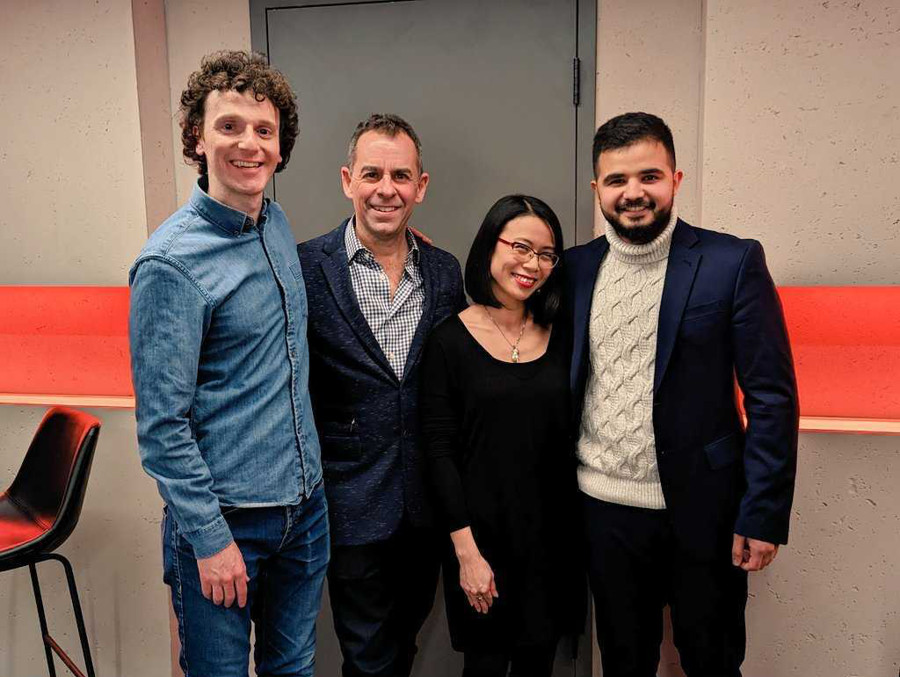In the Spotlight:
Haysam Kadri and Winnie Yeung

Director Haysam Kadri, actor Nabil Traboulsi, and writer Winnie Yeung. Photo by Dahlia Katz
If you ever meet up with Haysam Kadri and Winnie Yeung, you would swear that you were in the presence of life-lo ng friends. The two hail from separate worlds: Haysam is a celebrated actor, director, and instructor – with vast experience in the performing arts. Winnie is a high school teacher and the award-winning writer behind the book, Homes: A Refugee Story. Yet, the two possess a natural chemistry, humour, and ease around one another – one that usually results from decades of friendship. Yet, in their case, a connection didn’t come until 2021, when Grand Theatre Artistic Director, Dennis Garnhum introduced the two to create the world theatrical premiere of Homes: A Refugee Story. Two years and thousands of drafts later, as Homes takes to the Auburn Stage for the first time, the writing team reflect on the road to the Grand’s world premiere, and what audiences should expect.
- Winnie, who, or what, inspired you to turn Homes: A Refugee Story into a play?
Haysam: It was me, right Winnie?
Winnie: (laughing) Yes, it was all about you! No, actually it’s all about Dennis Garnhum. Years ago, he came to me with the idea of he and I co-adapting Homes for the stage. I knew it was amazing opportunity, so how could I say no? But then I thought, I know nothing about writing a play. But Dennis assured me that he would walk me through the process and really that was it! As a life-long learner, I know I couldn’t pass this up. And then Dennis had to tag out and find me someone else to work with: Haysam. I remember being so nervous, but once I met Haysam I knew we could do this. He gets me and my bizarre sense of humor. But mostly he understood Abu Bakr’s voice. And ultimately, all any of us want to do as lovers of stories, is to help Abu Bakr share his own story and see his dream take on a new iteration.
- What are the major differences between the book and the play?
Haysam: There are a lot of similarities because the source material is so good. Anyone who has read the book will tell you that it is a page turner, which is extraordinary in its storytelling. In the end, the structure of the play might be different, as we have taken some theatrical licence, but for the most part we have been very faithful to the book. We didn’t need to deviate too far. It’s such a compelling story, and Abu Bakr is the heart of it. It’s all through his eyes. Which is why we ended up making this a solo production.
Winnie: I’ve really learned so much from Haysam – in his wise old ways. (laughing) He has shown me the power in bringing dramatic moments to a story that is not melodramatic. In real life, Abu Bakr is quiet, humble, soft and so matter of fact about what happens to him. With Haysam, he taught me to see how we can heighten certain moments and emotions to increase the impact of the story. We also had to painstakingly cull down the story to only the most essential moments – and let me tell you, this was not an easy task!

Haysam Kadri and Nabil Traboulsi. Photo by Caitlin Core.
- What inspired you, or drew you, to direct Homes?
Haysam: Dennis did! Dennis truly was the catalyst of this production. Back in 2021, he called me and said ‘there is a great project that I want you to be a part of.’ He then turned me on to Winnie’s incredible book. Now, at this time, my mom was very involved with helping a refugee family in our hometown – recruiting me to help as well wherever I could. So, after reading Homes, I immediately saw the many parallel experiences between the book and this family. It was serendipitous; the timing felt perfect. And really, when Dennis has an idea, you listen and take note! His instincts are so right and he has this uncanny ability to hit something at the right time – he is honestly unbelievable and a wizard in that way.
- What is the overarching message/theme of Homes?
Haysam: Honestly, there are many themes in Homes. To me, one very obvious message is the many challenges that refugees face when entering Western culture, including: language barriers, discrimination, racism, lack of social support, finding secure employment, and potentially dealing with some horrific trauma.
For most, the refugee experience is a long and difficult one – but I don’t think that’s what the perception is here in Canada. So, I believe telling this story not only helps raise awareness for the difficulties that refugees face, but also helps build empathy and understanding. It serves as a reminder that behind the stats, behind the numbers, behind the sensationalized news, refugees are real people, whose lives have been upended. They deserve for their stories to be told and they deserve our respect.
Winnie: Absolutely. This is exactly why we all do what we do, as a function of art, to find humanity behind the headlines. We take a story that feels very foreign and we make it familiar.
Also, not to minimize, but what I love about Abu Bakr’s story is that he and his family have never seen themselves as victims. Often times, with the refugee title, there is so much baggage tied to it. But what has always really resonated with me is Abu Bakr’s openness in communicating that he wasn’t “some refugee you need to feel sorry for.” At the end of the day, he’s a kid. A kid who is suddenly placed in a whole new world, and feels like an outsider. In one way or another, we have all been outsiders at one point, and can relate to that. So, how do we bring them into the fold? We listen and we tell their stories.

The cast and creative team of Homes. Photo by Alex Rizkallah.
- Why does this story need to be told today?
Winnie: Working within the education sector, I see schools everywhere struggling with racism and inclusion. This story, this play, is a great way of making our newcomers feel less foreign, and less like “the other.” Because this is not a story of a refugee. It is a story of someone finding their way. In the end, I hope that Homes helps people see past the trauma, and understand how alike we all truly are.
Haysam: And to add to that, the refugee story is relevant. As we know, there is a refugee crisis happening right now with the tension and war between Russia and Ukraine. Unfortunately, this is not going away. We all must face this, and we all must educate ourselves in order to build compassion and empathy.
- What do you think will surprise people about this production?
Haysam: Hopefully a lot of things! It’s very ambitious in its storytelling and its devices. But, at the heart of it, I think people are going to see a lot of themselves in the main character: in Abu Bakr. As Winnie said earlier, he is just a kid. He has the same hopes and dreams as other kids. He loves video games, soccer, and his family. Outside of the extraordinary circumstances that surround him, anyone could look at Abu Bakr and say that they know him. You could see this kid in anyone.
What also might surprise audiences is how grounded this boy is with the circumstances around him. He constantly repels being a victim – showing incredible resiliency and resourcefulness.
Also, we have put together some extraordinary audio and visual moments which will be an exciting surprise for our audiences.

Nabil Traboulsi, Dennis Garnhum, Winnie Yeung, and Abu Bakr Al Rabeeah. Photo by Caitlin Core.
- Are there any secrets or insights you can share about the production for audiences eagerly awaiting the show?
Haysam: I don’t want to share too much, but what I will say is that we have a fantastic actor, the vehicle for this story, named Nabil Traboulsi. He is an amazing Canadian and Lebanese stage artist and television actor. He has been integral in this process. This play is a challenge for an actor, as you’re carrying an extraordinary story on your shoulders alone. It takes a special artist to pull this together. Abu Bakr is a real person who we want to honour and I think Nabil couldn’t be a better choice for this challenge.
Discover further individuals who are making a GRAND impact – on and off the stage
.png)



